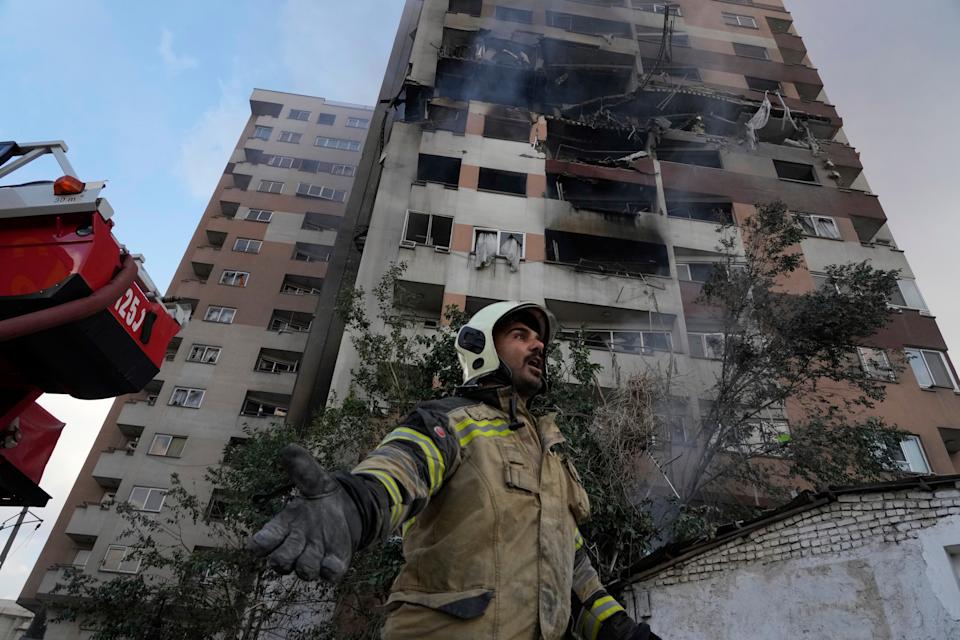
Wafric News - June 13, 2025
DUBAI, UAE – A dangerous new chapter in Middle East tensions unfolded Friday as Israel launched a large-scale assault targeting Iran’s nuclear and missile infrastructure, triggering swift Iranian retaliation. The high-profile attack marks one of the most significant military escalations in the region in recent decades.
The Israeli strikes struck key Iranian military and nuclear sites, including the Natanz uranium enrichment facility. Iranian authorities confirmed that at least two senior military commanders, including the head of the Islamic Revolutionary Guard Corps, Gen. Hossein Salami, and Iran’s armed forces chief of staff, Gen. Mohammad Bagheri, were killed.
In response, Iran launched over 100 drones toward Israeli territory, with officials in Iraq and Jordan reporting that the UAVs crossed their airspace. Israel claimed to have intercepted the majority of the drones before they reached its borders. However, the risk of direct war between the two regional rivals has significantly increased.
Iran’s Supreme Leader Ayatollah Ali Khamenei condemned the Israeli airstrikes as an act of “malice” and promised “severe punishment.” He accused Israel of targeting civilian areas, stating, “Israel opened its wicked and blood-stained hand to a crime in our beloved country.”
The strikes reportedly involved around 200 Israeli fighter jets and focused on dismantling radar stations, missile launchers, and nuclear-related infrastructure across western and central Iran. The International Atomic Energy Agency (IAEA) confirmed that one of Iran's main enrichment facilities had been hit and said it was monitoring for potential radiation hazards.




Israel Defends Actions as Preemptive
Speaking in Jerusalem, Prime Minister Benjamin Netanyahu framed the assault as a preemptive act aimed at neutralizing what he called an “imminent existential threat” from Iran’s nuclear program. “This is a clear and present danger to Israel’s survival,” Netanyahu said, adding that Iran’s enrichment efforts could yield a nuclear weapon “within months.”
While Israel has long opposed Iran’s nuclear ambitions, this attack marks a dramatic intensification. “Our goal is to remove this threat at its root,” said Netanyahu. He also addressed the Iranian people directly, asserting, “Our fight is not with you, but with the dictatorship that has oppressed you for 46 years. The day of your liberation is near.”
Domestically, the Israeli public appeared largely supportive of the military operation, though opposition leaders warned that prolonged conflict or Iranian reprisals could quickly shift public opinion. In major cities such as Tel Aviv and Haifa, residents rushed to stock up on emergency supplies and prepare bomb shelters.
Global Reactions and U.S. Position
The international community reacted swiftly. Middle Eastern governments condemned Israel’s actions, while Western leaders called for restraint and urgent de-escalation.
U.S. Secretary of State Marco Rubio confirmed that Israel acted unilaterally and that Washington was not involved in the strike. “Our top priority is protecting American forces and personnel in the region,” Rubio said, emphasizing that the U.S. remains committed to diplomacy.
Sources indicate that U.S. intelligence had anticipated potential conflict, with American diplomats pulled from Baghdad earlier this week and voluntary evacuations offered to military families in the region.
Former President Donald Trump, who is currently in office again, stated that while he did not expect an imminent attack, “it could very well happen.” He is expected to meet with his National Security Council later today to assess the situation.
Implications and Future Uncertainty
Friday’s events follow weeks of growing tension. On Thursday, the IAEA Board of Governors issued a formal censure of Iran for failing to cooperate with inspectors—a move that immediately led Tehran to announce new enrichment capabilities and expanded uranium processing at a third site.
Despite Iran’s continued insistence that its nuclear program is for civilian use, Israeli intelligence and Western analysts believe Tehran has come dangerously close to weapons-grade capabilities.
While U.S. intelligence agencies currently assess that Iran has not restarted a formal nuclear weapons program, the path to weaponization—should Iran choose it—could take only a matter of months.
The Israeli operation, described as one of the most complex in its military history, involved air refueling missions and long-range standoff missile strikes. Some reports suggest Israeli warplanes may have operated from Iraqi airspace.
As markets reacted to the escalating conflict, Brent crude oil spiked by nearly 8%, and Israel temporarily shut down Ben Gurion Airport due to security concerns.
A Region on the Brink
With casualties mounting and retaliatory threats circulating, the region stands on the precipice of further violence. Both Israeli and Iranian leaders have signaled that neither side is prepared to back down, despite urgent calls for calm from around the world.
Whether this latest confrontation spirals into full-scale war or pushes both nations toward a new phase of proxy or diplomatic conflict remains uncertain—but the cost of miscalculation is now dangerously high.
Reporting by Wafric News Middle East Bureau. Additional reporting from Jerusalem, Tehran, and Washington, D.C.
By WafricNews Desk.
By WafricNews Desk.


Comment
To post a comment, you have to login first
LoginNo Comments Yet...